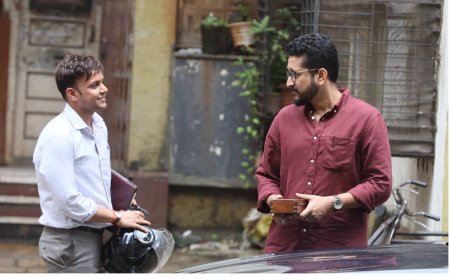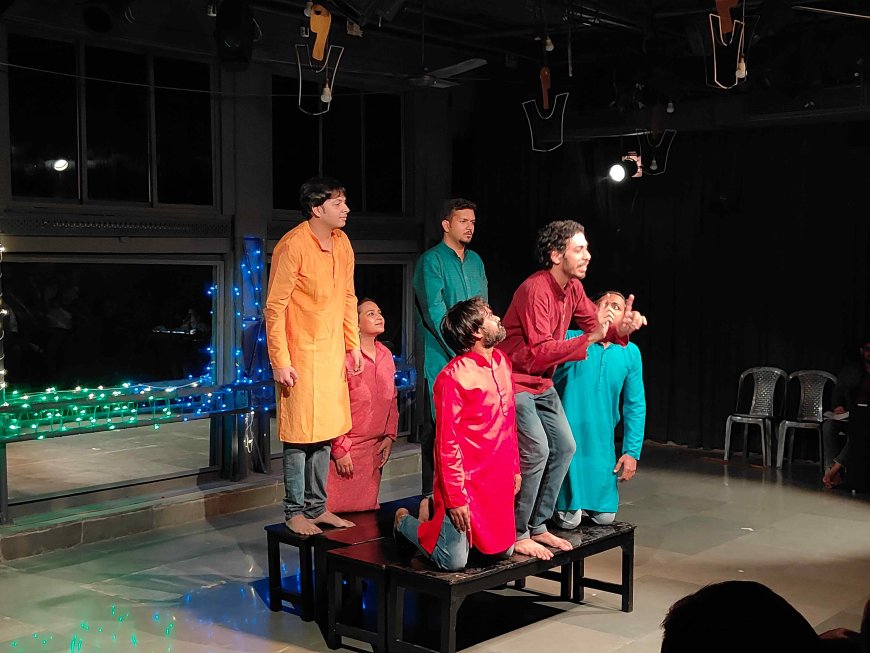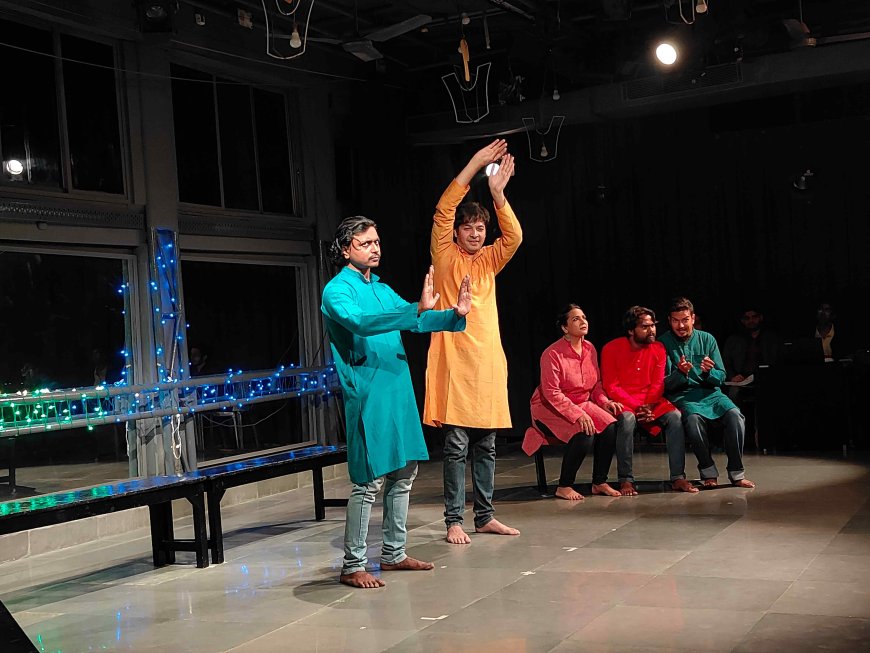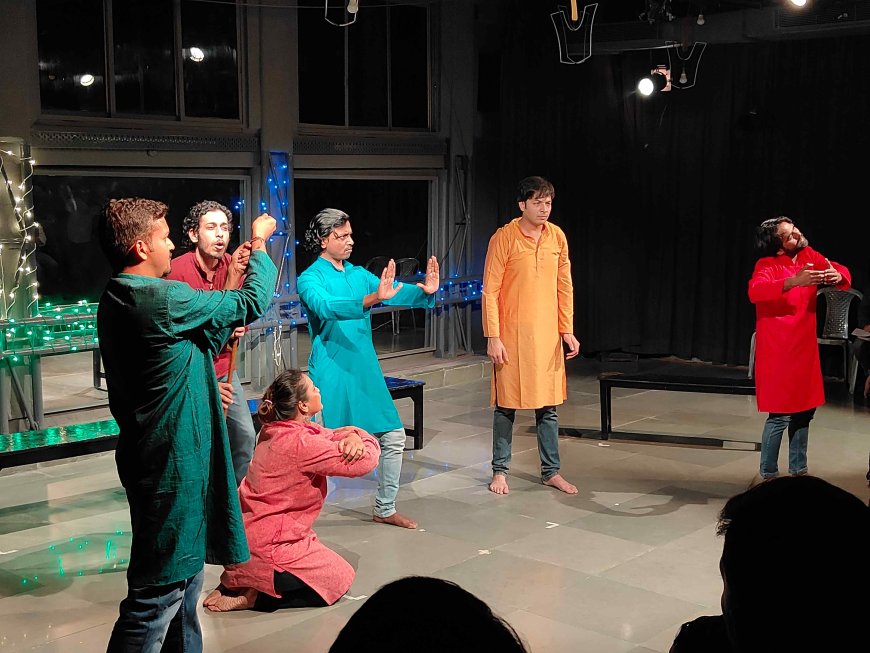ANDHON KA HAATHI: A POLITICAL SATIRE BY PADATIK AND RIKH
Dr. Shoma A. Chatterji offers an insightful review of the intriguing play titled "ANDHON KA HAATHI." The play has been interpreted in various ways, taking into consideration the current global political climate, with a particular emphasis on India's discussions regarding the Ram Mandir. The play is a part of the "GREAT NATIONAL DEBATE," exploring questions about whether Rama was a meat-eater or a vegetarian.
The earliest versions of the parable of blind men and the elephant are found in Buddhist, Hindu and Jain texts, as they discuss the limits of perception and the importance of complete context. The parable has several Indian variations. John Godfrey Saxe I was an American poet best known for his re-telling of the Indian parable "The Blind Men and the elephant” which introduced the story to a Western audience.
Vinay Sharma, the founder-director of Rikh, in collaboration with Padatik, recently directed a theatre performance called Andho Ka Haathi in Hindi at the Padatik Performance Space in Kolkata. The original play was written by the late Sharad Joshi, writer, playwright and humorist who had a special knack for political satire through comedy. The play is about five blind men and an elephant introduced to the audience by the sixth man who is the sutradhar of the play. Among the five blind people, there is a blind woman too, introduced because, “how can a play have some romantic juice without a woman?”
The parable of the blind men and an elephant is a story of a group of blind men who have never come across an elephant before and who learn and imagine what the elephant is like by touching it. Each blind man feels a different part of the animal's body, but only one part, such as the side or the tusk. They then describe the animal based on their limited experience and their descriptions of the elephant are different from each other. In a manner of speaking, they are wrong in the conception of a full elephant but right about the part they are describing. But a “part” can never take the place of the “whole” so the perception of each of the five blind men and woman is quite partial, individual and wrong.
The best quality of this play is that, just like the blind men who people it, it opens itself to different interpretations by the playwright who wrote the play in the first place, the director who chooses to stage the play with his group of actors, the actors who play each character symbolic of some truth within humanity and last, but never the least, the audience which is free to draw its own conclusions about the play.
This writer chooses to pick the last option of imagining a sutradhar, or the narrator who is pushed to have the play performed symbolizes the leader of the nation at any given point of time who manipulates the four blind men and one woman to imagine an elephant that does not exist. Right when the play opens, he asks, “but how will I bring an elephant on stage?” This makes a lot of sense. How, indeed, can an elephant brought on the performing space for the blind men to come and feel the body of the elephant and describe what they “see” about it through their feeling of touch?
But the concerned blind people are too blind to even suspect that perhaps, they are being lied to about an elephant by the sutradhar who is not blind because in any case, they would not be able to feel whether there is an elephant at all on stage or not. This interpretation however, is completely subjective and may differ from one viewer to the next. The original description by the playwright and the directors who staged the play at different times went like this: the sutradhar brings an elephant in the presence of the blind people and asks them to recognise what it is by touching it. Each blind man feels a different part of the elephant’s body, but only one part, such as the side or the tusk and describes it accordingly.
According to this original interpretation, each character on stage is a symbol connected to society. The narrator symbolizes the anxious common man of the nation, while the blind people represent the political leaders, their attitude towards the issues concerning the society and more. On the other hand, the elephant is a metaphor for issues that go unrecognized and unresolved because a clear conception of the “whole” is mssing.
But, considering the political situation that currently sustains in India, the needless war on Ukraine, the Israeli attack on Gaza, this writer would choose to interpret that the performing space is our nation, India, filled with blind men and women – the common mass – who know that there is actually nothing on the stage, no elephant, but are afraid of betraying their real understanding and pretend that they are actually feeling parts of an elephant that simply does not exist. Why are they afraid? Because other ‘blind’ men and women before them had told the truth – that there was no elephant on stage because they could not ‘feel’ any were sent behind bars without even the pretence of a trial!
This reminds us about that story called “The Emperor’s New Clothes” from Hans Anderson’s Fairy Tales where, when the King stood completely naked in the presence of his subjects, imagining that he was wearing his brand new clothes, there was only one little boy among the crowd who was innocent enough to cry out, “But the King is naked” to make the king realize that he was indeed, standing in front of the huge crowd, stark naked.
In this play directed by Vinay Sharma, the blind men and the single woman step into the stage, dressed in kurtas of different colours, possibly symbolic of the varied representations of humanity that exist today in our country. Their facial expressions change every minute, fluctuating between feelings of discovery, disbelief, happiness, joy, sadness, disappointment, much like the colours of the rainbow so brilliant is their performance. They use their bodies to full effect which underscores their fluid mobility to emphasise that they are physically able and can move about freely, with the support of each other, as they share a common physical challenge – they are blind. They are entirely dependent on the instructions of the sutradhar and feel lost when he disappears from the performing space even for a little while and when he comes, wielding a stick and waving it this way and that, symbolic of discipline that is unwarranted in the given situation, they seem to find some solace which actually does not exist.
The “sutradhar’ is perhaps, the head of the administration who has seen to it that the masses of the entire nation, irrespective of caste, creed, status, gender, age and so on, as the different colours of their kurtas symbolize, remain blind and continue to “feel and describe” an elephant which just does not exist!
Viewed from this perspective, which seems appropriate in the time, space and circumstances we are currently living in, this is a universal play which is a biting political satire and a scathing critique of the political philosophy that is thrust down our throats as “the truth, the truth and nothing but the truth” when, because of our choice to remain blind, we extend that choice to imagine an elephant that does not exist.
Brilliantly conceived and directed by Vinay Sharma, this may be a very distanced interpretation of Sharad Joshi’s original composition. But over time and space and the ever-changing political situation prevailing across the nation, the blind men and the woman are replicas of you and me, blind to the corrupt practices spilling over into the environment, blind to the pollution that is destroying the physical environment, blind to the malpractices in food, employment, education, health and transport because it suits us to remain ‘blind’ and continue to imagine that there is indeed an elephant on stage though it does not exist. After all, whether there is an elephant or not, does not make any difference to a nation full of “blind” people, does it? Take a bow, Vinay Sharma and team. What a brilliant performance. But, where has that little boy disappeared to?
*****
What's Your Reaction?


































































